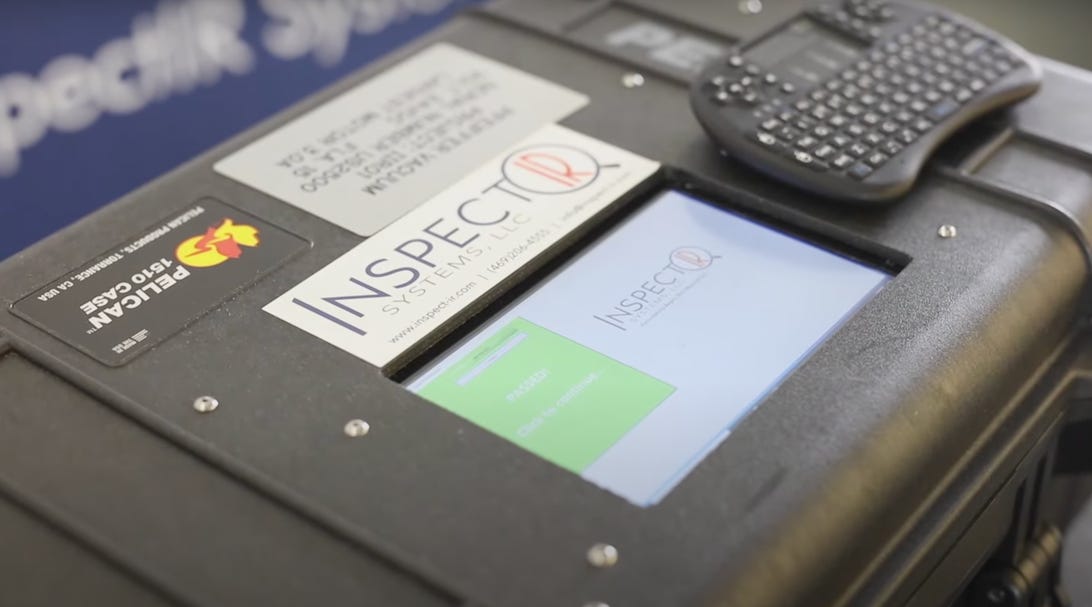The new breath test for COVID-19 requires a trained operator.
InspectIR
The US Food and Drug Administration recently authorized emergency use of the Inspectir Breathalyzer — a diagnostic test that uses exhalations, rather than nasal swab samples, to detect the presence of COVID-19. About the size of a small suitcase, the test kit searches for chemical compounds that are found in the breath of those infected with COVID.
InspectIR claims that the test is both less invasive and faster than PCR or even rapid antigen tests, making it potentially useful for public settings like offices, restaurants and airports.
In the FDA announcement of the emergency authorization, Dr. Jeff Shuren, director of the agency’s Center for Devices and Radiological Health, called the device “another example of the rapid innovation occurring with diagnostic tests for COVID-19.”
Read on to learn how the Inspectir COVID-19 Breathalyzer works, where it could be used and how it compares to PCR and rapid antigen tests. For more, learn how to order more free at-home COVID tests from the government and everything we know about the BA.2 subvariant and long COVID.
How does the Breathalyzer detect COVID?
The Breathalyzer uses a technique called gas chromatography-mass spectrometry (GC-MS) to separate and identify chemical mixtures and rapidly detect five volatile organic compounds in exhaled breath associated with SARS-CoV-2 infection.
Breath tests are used to rule out COVID in as many cases as possible in larger public settings. If the InspectIR COVID-19 Breathalyzer detects the presence of these markers, it delivers an unconfirmed positive test which InspectIR says should be confirmed with a PCR or antigen test.
“Negative results should be considered in the context of a patient’s recent exposures, history and the presence of clinical signs and symptoms consistent with COVID-19,” the company said.
How long does the Breathalyzer take to give results?
According to InspectIR, results from the breath test are available in less than three minutes.
That’s compared with two to three days for a PCR test at a testing site, an hour or so for a rapid PCR test and 15 to 30 minutes for rapid antigen tests.
InspectIR has characterized its breath test as a better screening method than taking a person’s temperature when it comes to workers returning to the office. And the company says other types of COVID diagnostic tests are uncomfortable and costly when repeated daily.

InspectIR’s Breathalyzer device can deliver COVID-19 test results in under three minutes, the company says.
InspectIR
How accurate is the Breathalyzer compared to PCR and rapid antigen tests?
According to the FDA, the InspectIR COVID-19 Breathalyzer has been shown to have 91.2% sensitivity in identifying positive virus results, and 99.3% accuracy with negative results. It presented false negatives 4.2% of the time.
PCR tests are the most sensitive diagnostics, able to detect even minute traces of SARS-CoV-2 with an accuracy rate of nearly 100%. But they’re expensive and must be performed in a clinical setting.
Rapid antigen tests, the kind available at supermarkets and pharmacies, and that are being given out free by the government, are less sensitive than either. One brand of rapid test, for example, correctly returned a positive result 83.5% of the time, according to information on the FDA’s site. That test correctly diagnosed a negative result 99.2% of the time. Rapid antigen tests can also result in a false negative if you’re tested early in your infection cycle.
Various studies have determined that antigen tests are more accurate in people with high viral loads and who are presenting symptoms.
Where could the Breathalyzer be used?
The Breathalyzer is portable but the test must still be administered by a trained technician, making it more suitable for hospitals, doctor’s offices and larger public spaces, rather than for homes or small businesses.
InspectIR has said it expects to produce approximately 100 Breathalyzers a week, which can each be used to evaluate about 160 samples per day.
“At this level of production, testing capacity using the InspectIR COVID-19 Breathalyzer is expected to increase by approximately 64,000 samples per month,” the FDA reported.
Who else is working on breath tests for COVID-19?
To date, only InspectIR has received FDA approval for use in the US. But numerous companies have been working on breath tests, including Singapore’s Breathonix, the UK’s Owlstone Medical, Indonesia’s GeNose C19 and Israel’s Scentech Medical.
In February 2021, SpiroNose became the first breathalyzer approved to test for COVID in the real world. It was used to screen workers at last year’s Eurovision Song Contest in Rotterdam.
“What we want is to exclude as many people as possible who might be infected with the coronavirus, Rianne de Vries, chief operating officer of Breathomix, the Dutch company that makes SpiroNose, told Science in May, “to reduce the testing burden and increase the willingness to test.”
The information contained in this article is for educational and informational purposes only and is not intended as health or medical advice. Always consult a physician or other qualified health provider regarding any questions you may have about a medical condition or health objectives.


